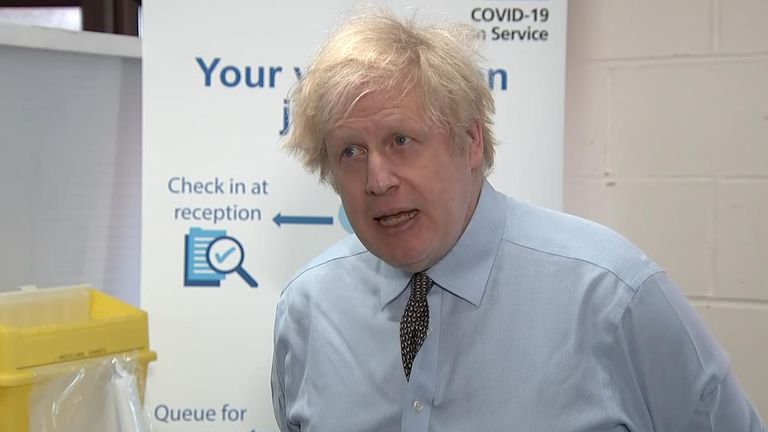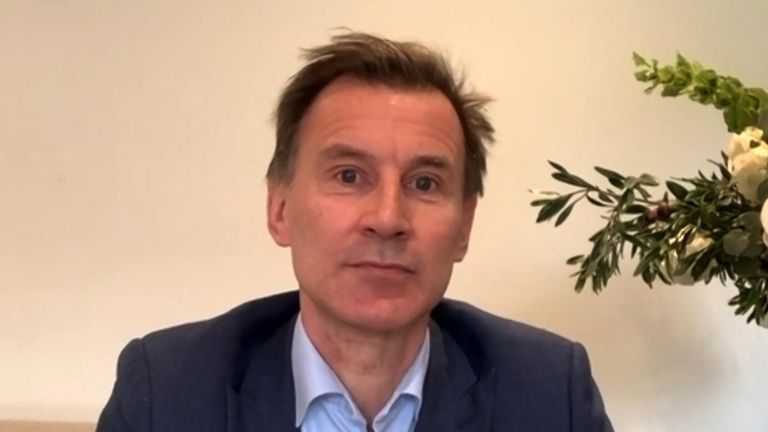The UK government has ordered COVID-19 vaccines for next year and has the option to order more for years to come - raising the question of whether boosters will be needed.
Like many other diseases, people may need to take an annual COVID-19 vaccine once the pandemic has ended to ensure people are protected and another pandemic does not occur.
The government announced it has agreed a deal to purchase 40 million doses of the Valneva vaccine, if it gets approval, to be distributed in 2022 "should we need to revaccinate any of the UK population", the head of the vaccines taskforce said.
While scientists do not yet know if boosters will be needed, the government has also secured the option to buy a further 90 million Valneva doses between 2023 and 2025 to ensure people can get boosters if needed.
Sky News examines whether a vaccine booster will be needed and how that would work.
Dependent on whether the vaccine prevents infection
"So much depends on what sort of effect the vaccine has," Dr Peter English, a communicable disease control consultant, former editor of Vaccines in Practice magazine and ex-chair of the BMA public health medicine committee, told Sky News.
The approved vaccines, such as the Oxford/AstraZeneca and Pfizer jabs, have been proved to prevent serious illness, but not enough time has passed to assess whether they prevent transmission.
"We've got some indications they will prevent transmission, but probably not as much as they prevent serious illness - we've also got no data on how much they can prevent Long COVID," Dr English added.
"We might see that they're between 30-70% effective in preventing infection and transmission, but I hope I'm wrong and it's higher."
Herd immunity
At the beginning of the pandemic "herd immunity" was suggested as a way of protecting the population through a majority of people getting COVID-19 - with the assumption they could not be reinfected.
Due to the nature of COVID-19, that has been rejected by scientists, but the phrase is used within medical circles to describe when enough people have immunity to ensure a disease does not spread. In this case, through a vaccine.
"If we don't get herd immunity the virus will continue to circulate in the population," Dr English said.
To ensure herd immunity, the R number - the number of people one infected person can transmit COVID-19 to - needs to be brought to one or less, the consultant explained.
Using measles, one of the world's most infectious diseases, as an example, Dr English said you have to get 17 out of 18 people immunised to get an R number of 1 or less and therefore achieve herd immunity where people are not spreading the disease.
"The same applies to COVID-19, the original strain had an R number of nearly three so you'd have to have two out of every three people vaccinated to achieve herd immunity," he said.
"With the new variants, they're said to be about 50-70% more infectious so you have to multiply the current with 1.5 or 1.7 which makes the R number four or five - so you'd have to get three out of four, or four out of five people vaccinated."
Will we have to be vaccinated annually?
Dr English said: "We just don't know how long the vaccines will last so you might have to revaccinate.
"Quite often vaccines are more effective than natural immunity but we might need to vaccinate everybody every year, or two or three, for quite some time and maybe forever.
"And the more variants we see, the more there might be a need to tweak the vaccine so a booster may be needed for that.
"We do that for the flu vaccine as it mutates yearly."
He added that scientists are already working at trying to include the COVID-19 vaccine with a flu vaccine so they can be given together, a method currently used to give children five vaccines at once.
Will it depend on which vaccine a person is given initially as to whether they need a booster?
As the vaccines have not been around for very long that is not yet possible to answer.
Dr English added: "It's really difficult to say which vaccine is more effective because their studies were all carried out differently.
"The Oxford vaccine is probably just as effective as the Pfizer and Moderna ones but they trialled them differently so the final efficacy is hard to determine from that, and they are continuing to draw data from them."
None of the approved vaccines will be hard to tweak if needed for a new variant, Dr English said.
However, whether that can be approved quickly depends on whether the regulators accept tweaks, as they do for the flu vaccine every year, or if each vaccine change has to go through the full regulatory process, which can take years.
The Link LonkFebruary 02, 2021 at 01:57AM
https://ift.tt/3pLF0xS
COVID-19: Will we need an annual vaccine booster? - Sky News
https://ift.tt/2DVP6sH



No comments:
Post a Comment